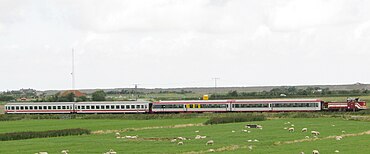Through car

A coaches is a passenger coaches of rail , of the sections from the rest of a train has different path.
The car is "switched" individually from one train to the other. This guarantees a connection-free connection on routes that are not heavily frequented. Because of the manpower and time-consuming maneuvering movements and condensed cycle timetables, there are rarely through car connections in Western Europe. The push-pull trains, which are also increasingly used in long-distance transport (France from 1978, Germany from 1995, Austria from the mid-2000s) only rarely have through cars coupled to the control car or the locomotive. In this configuration there is no continuous accessibility. With multiple units and especially with aerodynamically optimized high-speed trains , through cars are not possible. On many routes, the through cars have been replaced by the wing train concept .
In Germany there are coaches compounds almost exclusively in distribution transport to the North Sea - Islands Fohr and Amrum on the route Niebüll Dagebüll and at night passenger trains . In other countries, through cars are used more often. So z. B. the parade trains Bernina-Express and Glacier-Express of the Rhaetian Railway and the Matterhorn-Gotthard-Bahn ( Switzerland ) in the off-season often only as through carriages. On the railways of the successor states of the Soviet Union , through coach connections have a comparatively high proportion of passenger traffic by rail . Due to the often long distances that can lead to travel times of several days, the loss of time due to maneuvering is less important here.
An example of through car races is the D-Night offer . These are overnight express train connections to Eastern Europe offered by various railway companies . D-night connections from Germany no longer exist: the D-train from Berlin to Kiev (with through coaches to Kaliningrad , Lemberg , Dnipro , Donetsk , Simferopol , Kharkiv and Odessa ) was discontinued by the IP at the end of 2012 due to insufficient profitability. The express train from Berlin to Saratov (with through cars to Novosibirsk , St. Petersburg , Chelyabinsk and Omsk ), which was operated by RŽD cars , was also discontinued at the 2013 timetable change.
The world's longest rail connection without the need to change trains is the approximately nine-day trip over 10,272 kilometers with the Moscow – Pyongyang through car, which leaves Moscow on the 11th and 25th of each month. He is attached to the train number 2 "Rossiya" Moscow-Vladivostok and used after uncoupling in Ussuriysk border crossing at Khasan / Tuman-gang .
See also
literature
- Wilfried Biedenkopf: Across old Europe. The international train and through car runs as of the summer of 1939. Publishing house and office for special traffic literature Röhr, Krefeld 1981, ISBN 3-88490-110-9 .
Web links
Individual evidence
- ↑ Jürgen Janicki, Horst Reinhard: Rail Vehicle Technology . 2, revised and expanded edition. Bahn Fachverlag, Mainz 2008, ISBN 978-3-9808002-5-9 , p. 353 ( limited preview in Google Book Search [accessed August 27, 2016]). “With the introduction of compressed cycle timetables, the time spent on the platform had to be shortened for reasons of capacity. Instead of changing locomotives, only push-pull trains with control cars and, as an alternative, multiple units were considered in long-distance transport. "
- ↑ Train compositions 2011/2012: D 445 "Kashtan"
- ↑ Night trains in Europe: Rail cancels direct connection from Berlin to Kiev , Matthias Meisner / Die Welt , September 22, 2012
- ↑ Train compositions 2012/2013: D 1249
- ↑ Record route: Berlin-Novosibirsk rail connection is discontinued , Berliner Morgenpost , November 12, 2013
- ↑ "forum post D1249 Berlin-Saratov timetable change" with links to Russian-language media
- ↑ The Forbidden Railway to North Korea. In: www.andersreisen.net. December 4, 2009. Retrieved July 25, 2016 .
- ↑ blog about the train journey (English)
